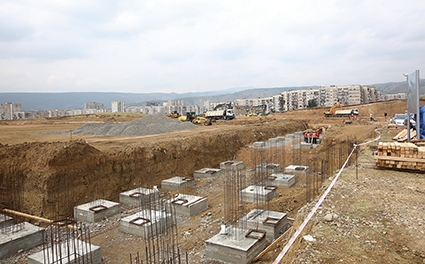Squeezing Out Our Air: A Suburban Drama
OP-Ed
Once upon a time, there was an ecologically clean suburb called Didi Dighomi…
Didi Dighomi is a suburb of Georgia’s capital city Tbilisi. It is said to be an air corridor for the city and while it is ferociously windy in winter, it is pleasantly cool in summer, with temperatures 2-3 degrees lower than in the center.
Today, with an increasing number of ecological problems related to the cutting of trees in the city, which many consider as already “out of control,” as well as a lot of construction work and the resulting dust, suburbs are often the desirable places to live. The only consolation of the local population who choose to live there, after the 30-minute-to-hour-long commute through ever-increasing traffic jams, is that, at the end of the day, they can fill their lungs with fresh air.
Such was the disposition of N. when she, enjoying both good salary and living conditions, decided to follow the western tendency, sold her flat in the prestigious central Vake district and moved to Didi Dighomi to live in the fresh air. Having done so, she enthusiastically set to creatively styling her new private house, which included installing a swimming pool in the garden. When her second summer there arrived, she eagerly slipped into her swimming costume and stretched out beside said pool to enjoy the sun on her chaise-longue, feeling blessed. Then she caught sight of two young men looking down from the neighboring block of apartments. Bang went the joy of her no longer private garden.
There was a period when private settlements, so lovely and beautiful, diverse in color and style, reminded us of the European and American suburbs. But once the constructors move in, these are often marred by the multi-story concrete mushrooms springing up around and within. Even those enjoying air and view in said blocks find their joys squeezed out: where M., living on the 10th floor, has been extremely lucky to keep a nice unobstructed view of Sameba (Trinity) Cathedral (which was meant to be seen from all corners of Tbilisi), S., who lives on the 5th floor, will have no such pleasure from now on.
Urbanization- both a necessity and a curse. Villagers flood from the regions to Tbilisi in search of education and work, the flow having been especially strong in the early years of this century following closure of the soviet factories. However, unfortunately, some of these villagers simply abandoned their land, being reluctant to work in the fields and preferring to try their luck in trade- not realizing well that the economy and strength of the country is based on strong villages. Thanks to mortgages, buying an apartment has become much more affordable than before; the city population grows, the demand increases and ever more blocks are built to accommodate…at the sacrifice of the good fresh air.
Let’s get back to still-airy Didi Dighomi. Z., in his 50s, desperately fell in love with the idea of having a private garden. Several years ago, he purchased a house and settled down in Didi Dighomi together with his wife. He was happy to have the chance to grow his own organic fruit and vegetables. He now says that with the passing of years and constant construction works around him, he struggles to breathe, let alone produce fruit and veg worth eating.
N. and Z. are neighbors. Together with the others of their community, including the dwellers of the neighboring blocks of apartments, they share one valley unofficially used as a stadium from time to time by football players, a real paradise on summer evenings, seeing numerous locals enjoying an evening stroll there. Rumors are now circulating that this space is being sold to developers. Neighbors collected signatures to protest the move and sent them to Tbilisi City Hall. However, the only consolation they received in reply was that the undisclosed new owners of the land will not build anything until 2018. The local dwellers rightly point out that, unlike other suburbs, there is not a single park in the whole of Didi Dighomi to replace this loss.
I tried to speak to the new owners of said green land, which was apparently sold to him unlawfully years past. He refused to go into detail, merely mentioning that “his” territory covers 13,000 square kilometers. If this is then sold on to construction companies, we can bid farewell to the fresh air here, too.
Didi Dighomi represents not only an ecological suburb, but is unofficially known as the air corridor of the capital city. Where will Tbilisi be fed with air from in the near future? Does anyone in charge ask this question in the long-run when planning the construction of more and more blocks of apartments which are based on short-term goals? What is the point of so many apartments if we have no air to breathe?
All those mentioned in this piece chose to stay incognito as some of them are employed in public organizations. However, they have one great concern in common. According to the Interim Head of Service of Architecture under Tbilisi City Hall, Zura Tsiklauri, the permission to build on that 13,000 sq.m. was given during the rule of Saakashvili’s government and is just now being finalized. It is hard (and sad) to believe when, like mushrooms after the rain, more and more new blocks of apartments emerge throughout the city at the expense of trees and air...
Once upon a time, there was an ecologically clean suburb called Didi Dighomi…
Maka Lomadze












